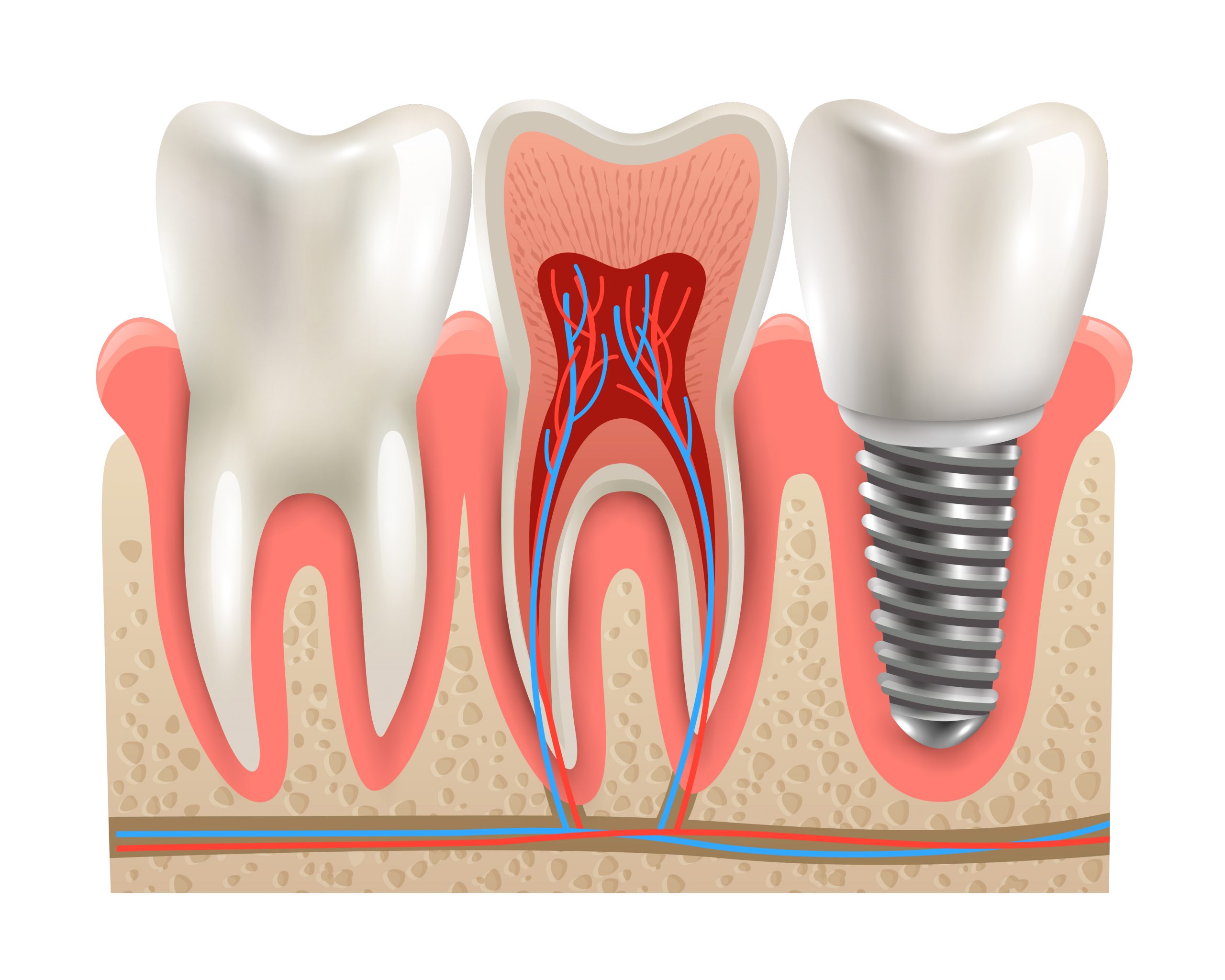
Dental implants have revolutionized the way we think about replacing missing teeth. Whether you lost a tooth years ago or more recently, implants can restore not just your smile but your confidence and oral health. In this article, we’ll walk you through the implant process, explore the benefits, and highlight how to care for them long term — especially for patients in Walkerton.
What Are Dental Implants?
A dental implant is a small titanium post that acts as an artificial tooth root. It’s surgically placed into your jawbone and then capped with a crown, bridge, or denture to provide a stable, natural-looking replacement for missing teeth. Implants fuse with your bone in a process called osseointegration, which makes them remarkably durable and reliable.
Because implants mimic the structure of a natural tooth — root plus crown — they provide support for chewing and help maintain healthy bone. Unlike dentures that may slip, or bridges that rely on neighboring teeth, implants stand on their own.
The Implant Process: Step by Step
-
Consultation & Assessment
It all starts with a comprehensive evaluation. Your dentist will review your medical and dental history, take X-rays (or 3D scans), and assess your jawbone density. This helps determine whether you’re a good candidate for implants. Sometimes, a bone graft is needed if there’s not enough bone to securely anchor the implant. -
Treatment Planning
Once your jaw is ready, the next step is a detailed treatment plan. You and your dentist will decide on the type of restoration (single crown, bridge, or denture), the number of implants, and the timeline. This plan ensures everything is customized to your unique needs. -
Surgical Placement
During surgery, the titanium implant is placed into your jawbone. Depending on the case, this can be done under local anesthesia or sedation for added comfort. Once the implant is in place, you’ll need to wait several months for osseointegration — the process when the bone grows around the implant to secure it firmly. -
Abutment Placement
After osseointegration is complete, your dentist attaches an abutment to the implant. The abutment acts as a connector between the implant and the final restoration. Sometimes, the abutment is placed at the same time as the implant; in other cases, it’s added after healing. -
Restoration
The final step is placing the prosthetic tooth — a crown, bridge or denture — on top of the abutment. This restoration is custom-made to match your natural teeth in shape, color, and size, giving you a seamless smile. -
Follow-up
Your dentist will schedule follow-up visits to check the healing, make any necessary adjustments, and ensure a perfect fit. Regular check-ins help keep the implant functioning well for years.
The Many Benefits of Dental Implants
-
Natural Look and Feel: Implants are highly aesthetic. Because they mimic the structure of a real tooth, they look, feel, and function just like one.
-
Durability: With proper care, dental implants can last many years — often decades — making them a long-term investment in your oral health.
-
Bone Preservation: When a tooth is lost, bone resorption can occur over time. Implants stimulate the jawbone, helping to prevent bone loss and maintain facial structure.
-
Improved Comfort: Unlike removable dentures, implants don’t slip or rub, so you can eat, speak, and laugh with confidence.
-
Enhanced Functionality: You can chew your favorite foods more easily, because implants provide strong, stable support.
-
Better Oral Health: Implants don’t rely on neighboring teeth for support, so they help preserve surrounding natural teeth.
-
Long-Term Cost Efficiency: While the upfront cost may be higher than other options, implants often save you money in the long run by reducing the need for frequent repairs or replacements.
Caring for Your Dental Implants
To ensure your implants last and remain healthy, good oral hygiene and maintenance are essential. Here are proven daily and periodic habits to follow:
-
Brush Gently but Thoroughly
Use a soft-bristled toothbrush and non-abrasive toothpaste. Brush at least twice a day, paying close attention to the gum line where the implant meets your gums. Angle your brush to clean around the abutment and restoration without damaging surrounding tissues. -
Floss or Use Interdental Cleaners
Just like natural teeth, implants need flossing. Use implant-safe floss or interdental brushes to clean between the implant and adjacent teeth. These tools help remove plaque and food particles where your brush can’t reach. -
Rinse with Mouthwash
An alcohol-free, antimicrobial mouthwash is very helpful. Rinsing daily helps reduce bacteria and supports gum health around the implant. -
Avoid Harmful Habits
Avoid smoking or using tobacco, as it interferes with healing and increases the risk of implant failure. Also, be careful with hard foods; don’t use implants to crack nuts, chew ice, or bite very hard objects. -
Wear a Night Guard if Necessary
If you grind or clench your teeth, wearing a custom night guard protects both your implants and natural teeth from damage. -
Attend Regular Dental Visits
Schedule check-ups and cleanings at least twice a year. During your visits, your dentist will assess the implant, check for signs of inflammation, and professionally clean around the implant to remove any buildup. -
Maintain a Healthy Lifestyle
Eat a balanced diet rich in calcium and vitamins to support strong bone and gums. Drink plenty of water, which helps flush away bacteria and debris around the implant.
Are Implants Right for You in Walkerton?
If you’re in Walkerton and considering dental implants, you’re making a choice backed by strong science and long-term benefits. Whether you’re missing a single tooth or several, implants can restore both form and function. Many patients in our community find that implants give them renewed confidence, better eating ability, and a brighter smile.
However, not everyone is an immediate candidate. Good bone density, healthy gums, and overall good health are important factors for successful implant treatment. That’s why your first step should always be a consultation with a trusted dentist who specializes in implant care.
Why Choose Us for Implant Treatment
At Brockton Family Dental, we specialize in comprehensive implant care tailored to your unique needs. Our team is dedicated to guiding you through every phase — from initial consultation through long-term maintenance — to help you achieve a natural, lasting smile in Walkerton.
If you’re ready to explore dental implants or want to learn whether they’re a good fit for you, don’t hesitate to reach out. You can learn more about dental implants on our website or schedule a consultation for dental implants at Brockton Family Dental to get started.


